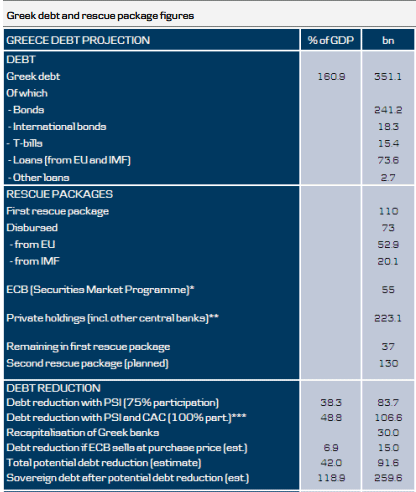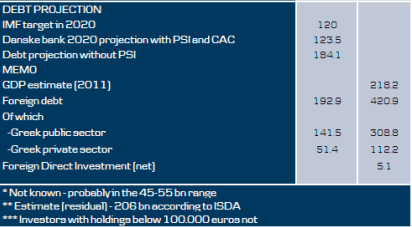The Greek parliament approved the austerity package with 199 for and 74 against. 43 members of the governing socialists (PASOK) and conservatives (ND) voted against and were immediately expelled by their parties.
The Eurogroup finance ministers are expected to give the final approval of the second rescue package on Wednesday. Details on the debt swap and PSI are expected to be revealed shortly after the second rescue package is endorsed.
Papademos manages to secure parliamentary support
Late Sunday night the Greek parliament approved the austerity package with 199 for and 74 against after a weekend of protests and riots in Athens, which escalated on Sunday evening and spread to other places in Greece. 43 members of the governing socialists (PASOK) and conservatives (ND) voted against the package and were immediately expelled by their parties. They will remain independent members of parliament, and it could be that some will form a new party. This remains an open question. One thing is certain: the political climate in Greece is changing dramatically and in particular PASOK have lost public support.
The risk of more social unrest in the coming days remains. Nevertheless, our main scenario is that Greece gets the implementation of the bailout package and the debt swap through in time to avoid an uncontrolled default in March.
Euro area ministers set to approve rescue package Wednesday
The Euro working group is set to meet on Tuesday while the Eurogroup finance ministers will give the final approval of the second rescue package on Wednesday. Also details on the debt swap and private sector involvement are expected shortly after, possibly on the same evening.
The new rescue package and PSI will aim to reduce the debt level to 120% of GDP by 2020. The new package will comprise up to EUR100bn in additional financing and up to EUR30bn in official sector contribution to bank restructuring in the wake of the PSI.
It will be very interesting to see whether collective action clauses (CACs) will be
imposed, and hence whether we from a legal point will have a default that will trigger CDS contracts. We expect that investors who do not accept the voluntary agreement will be forced to participate, as the Greek government will introduce CACs into Greek law imposing the terms of the PSI agreement negotiated by the IIF and the Greek government on all private investors.
However, the Greek government will probably try to avoid harming Greeks who have put their pension savings into government bonds. Therefore, bond portfolios of less than EUR100,000 that have been held by the same investor for a long time will probably be exempt. We do not know the cut-off data for exemption. This could be 1 January 2012 or 21 July 2011, when the PSI was initially announced.
The ECB is expected to forego profits on its holdings of Greek government bonds. This could reduce Greece’s debt by an additional estimated 5% of GDP. At the last ECB press conference, Mario Draghi ruled out the possibility of the ECB taking losses on its government bond holdings as this would violate the prohibition of monetary financing. This does not rule out the possibility that the ECB could sell its bonds at purchase price. 

- English (UK)
- English (India)
- English (Canada)
- English (Australia)
- English (South Africa)
- English (Philippines)
- English (Nigeria)
- Deutsch
- Español (España)
- Español (México)
- Français
- Italiano
- Nederlands
- Português (Portugal)
- Polski
- Português (Brasil)
- Русский
- Türkçe
- العربية
- Ελληνικά
- Svenska
- Suomi
- עברית
- 日本語
- 한국어
- 简体中文
- 繁體中文
- Bahasa Indonesia
- Bahasa Melayu
- ไทย
- Tiếng Việt
- हिंदी
Greece Votes Package Through
Published 02/13/2012, 04:51 AM
Updated 05/14/2017, 06:45 AM
Greece Votes Package Through
Latest comments
Loading next article…
Install Our App
Risk Disclosure: Trading in financial instruments and/or cryptocurrencies involves high risks including the risk of losing some, or all, of your investment amount, and may not be suitable for all investors. Prices of cryptocurrencies are extremely volatile and may be affected by external factors such as financial, regulatory or political events. Trading on margin increases the financial risks.
Before deciding to trade in financial instrument or cryptocurrencies you should be fully informed of the risks and costs associated with trading the financial markets, carefully consider your investment objectives, level of experience, and risk appetite, and seek professional advice where needed.
Fusion Media would like to remind you that the data contained in this website is not necessarily real-time nor accurate. The data and prices on the website are not necessarily provided by any market or exchange, but may be provided by market makers, and so prices may not be accurate and may differ from the actual price at any given market, meaning prices are indicative and not appropriate for trading purposes. Fusion Media and any provider of the data contained in this website will not accept liability for any loss or damage as a result of your trading, or your reliance on the information contained within this website.
It is prohibited to use, store, reproduce, display, modify, transmit or distribute the data contained in this website without the explicit prior written permission of Fusion Media and/or the data provider. All intellectual property rights are reserved by the providers and/or the exchange providing the data contained in this website.
Fusion Media may be compensated by the advertisers that appear on the website, based on your interaction with the advertisements or advertisers.
Before deciding to trade in financial instrument or cryptocurrencies you should be fully informed of the risks and costs associated with trading the financial markets, carefully consider your investment objectives, level of experience, and risk appetite, and seek professional advice where needed.
Fusion Media would like to remind you that the data contained in this website is not necessarily real-time nor accurate. The data and prices on the website are not necessarily provided by any market or exchange, but may be provided by market makers, and so prices may not be accurate and may differ from the actual price at any given market, meaning prices are indicative and not appropriate for trading purposes. Fusion Media and any provider of the data contained in this website will not accept liability for any loss or damage as a result of your trading, or your reliance on the information contained within this website.
It is prohibited to use, store, reproduce, display, modify, transmit or distribute the data contained in this website without the explicit prior written permission of Fusion Media and/or the data provider. All intellectual property rights are reserved by the providers and/or the exchange providing the data contained in this website.
Fusion Media may be compensated by the advertisers that appear on the website, based on your interaction with the advertisements or advertisers.
© 2007-2025 - Fusion Media Limited. All Rights Reserved.
